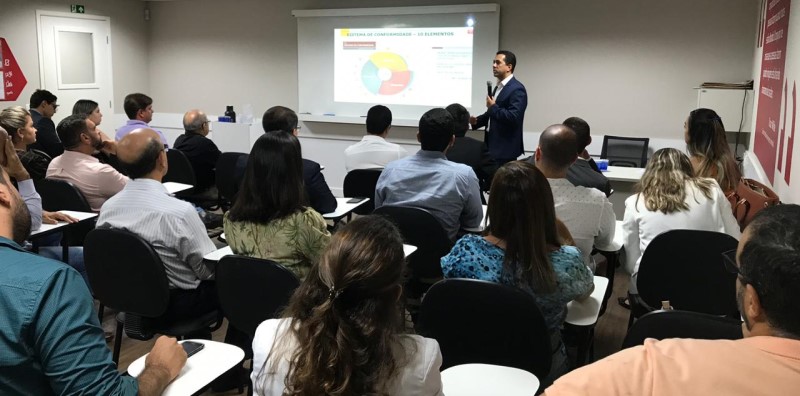
With a construction record of more than 2,500 major developments, including hydroelectric power plants, ports, airports, gas pipelines and subway lines, Odebrecht Engineering & Construction (OEC) is structured to regain society’s confidence on the issue of ethics and to combat corruption. The Compliance System, introduced by the company in the last two years, was presented in Salvador by the person regionally responsible for compliance in the Americas (except for Brazil, Argentina and Bolivia), Marcos Neves, during a Bahian Faculty of Law (FBD) Compliance Committee meeting.
According to the executive, OEC’s presence in 22 countries was a major challenge, as the company needed a single, global operation, even in the territories where an “ethical culture” has not yet been incorporated into every environment. He also highlighted that this “ethical culture” has been increasingly gaining space in Brazil following Operation Lava Jato (Car Wash). A further challenge is in Latin America, where international transparency movement registers that the corruption perception index is significant in almost all the countries in the region.
Timeline – The start of the course of evolution presented by the Bahian, Marcos Neves, was 2016, when the Odebrecht Group made a commitment of definitive collaboration to Brazil. Since then, said the executive, a robust Compliance System has been introduced, focusing on prevention, detection and remediation, in order to guarantee ethical and transparent activity with integrity.
“Our system is based on the most advanced international legislation and standards to combat corruption. Six of the 10 elements of our system are directed towards prevention and our policies and guidelines enable a continuous monitoring and improvement process,” guaranteed Neves.
The internal framework introduced by OEC clarifies its position of no longer tolerating corruption in any form, including extortion and bribery. Therefore, the human factor has merited the full attention of the company, which has been systematically training its members in international best practices.
Results – Also according to Neves, a good example of the OEC system coverage is in the diligence of third parties and the entire value chain. “Our initial supplier base was made up of 530,000 companies and individuals. Having evaluated commercial relationships and reputational requirements, as examples, the base was reduced to 18,000 active suppliers. Through the Due Diligence guideline, introduced in January 2017, we have created a single database and have undertaken more than 15,000 procedures, guaranteeing that 100% of new suppliers undergo a reputation analysis before making any payments,” reveals Neves.
For the executive, another important indicator comes from the Ethics Line, outsourced to a specialized company since May 2017. The program has received 341 reports through this, and 27% of the cases have been confirmed. “Brazil has accounted for 56% of the cases reported until now on the Ethics Line and 28 members have been discharged as a consequence of investigations in various countries,” he revealed.
The OEC System regulates and monitors processes, such as: Due Diligence, Hospitality, Donations and Social Investments, Sponsorship, Political Contributions, Relationships with Public Officials, Conflicts of Interest and Training.
“Systematic and rigorous application of the Compliance Program is enabling the Group to regain society’s confidence and continue to be recognized for its engineering and construction experience. I strongly believe we will regain our credibility,” Neves concluded.
The person responsible for communication for the northeast at Odebrecht S.A., Marcelo Gentil, the person responsible for People, Finance and Compliance at the Odebrecht Foundation, José Ernesto Gonzalez, and the Compliance Committee chairman, José Guimarães attended the meeting held at FBD.
Access OEC's Compliance System here.
The Compliance System, introduced by the company in the last two years, was presented in Salvador by the person regionally responsible for compliance in the Americas (except for Brazil, Argentina and Bolivia), Marcos Neves, during a Bahian Faculty of Law (FBD) Compliance Committee meeting.